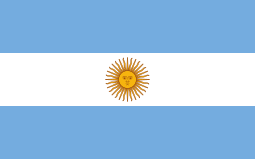 | |
| Use | National flag and state and naval ensign |
|---|---|
| Proportion | 5:8 |
| Adopted | February 27, 1812 (original), 1861 (current version), November 2010 (standardization) |
| Design | A horizontal triband of light blue (top and bottom) and white with a Sun of May centered on the white band. |
| Designed by | Manuel Belgrano |
 | |
| Use | Civil flag and ensign |
| Proportion | 5:8 or 9:14 |
| Adopted | February 27, 1812 |
| Design | A horizontal triband of light blue (top and bottom) and white (center). |
| Designed by | Manuel Belgrano |
The national flag of the Argentine Republic, often referred to as the Argentine flag (Spanish: bandera argentina), is a triband, composed of three equally wide horizontal bands coloured light blue and white. There are multiple interpretations on the reasons for those colors. The flag was created by Manuel Belgrano, in line with the creation of the Cockade of Argentina, and was first raised at the city of Rosario on February 27, 1812, during the Argentine War of Independence. The National Flag Memorial was later built on the site. The First Triumvirate did not approve the use of the flag, but the Asamblea del Año XIII allowed the use of the flag as a war flag. It was the Congress of Tucumán which finally designated it as the national flag, in 1816. A yellow Sun of May was added to the center in 1818.
The full flag featuring the sun is called the Official Ceremonial Flag (Spanish: Bandera Oficial de Ceremonia). The flag without the sun is considered the Ornamental Flag (Bandera de Ornato). While both versions are equally considered the national flag, the ornamental version must always be hoisted below the Official Ceremony Flag. In vexillological terms, the Official Ceremonial Flag is the civil, state, and war flag and ensign, while the Ornamental Flag is an alternative civil flag and ensign. There is controversy of the true colour of the first flag between historians and the descendants of Manuel Belgrano between blue and pale blue.
It is one of the five flags that use the ratio 5:8, the others being Guatemala, Palau, Poland, and Sweden.